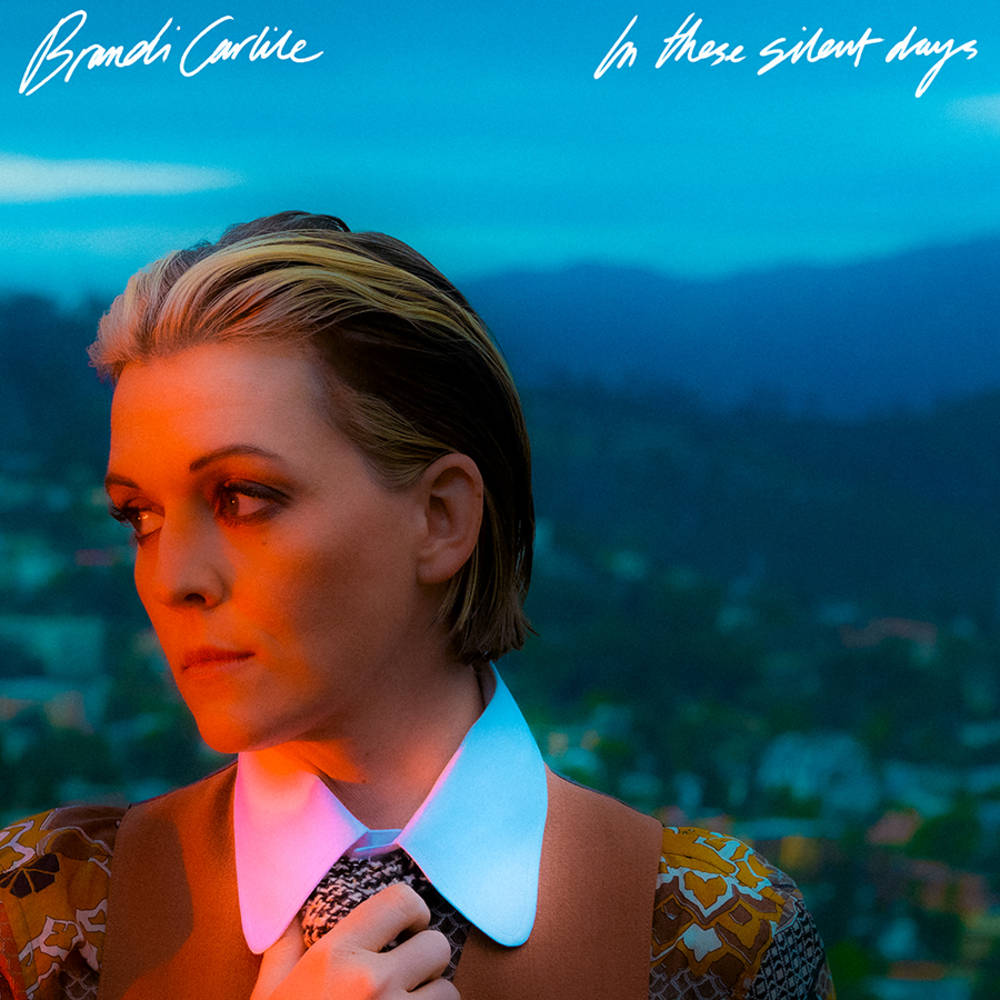Brandi Carlile: ‘In These Silent Days’ Album Review
by Will Groff, Staff Writer

It’s been a busy three years for singer-songwriter Brandi Carlile since she released her last album, the mid-career breakthrough By the Way, I Forgive You. Here are just a few of her numerous and varied accomplishments:
She swept the Americana categories at the 2019 Grammys before delivering an earth-shattering, moment-defining performance of “The Joke”; co-wrote and co-produced While I’m Livin’, the long-awaited comeback album from country legend Tanya Tucker; co-founded acclaimed supergroup the Highwomen with Amanda Shires, Natalie Hemby and Maren Morris; curated the first-ever all-woman headlining set at the Newport Folk Festival in 2019 — featuring a surprise appearance by none other than Dolly Parton — and created Girls Just Wanna Weekend, a music festival modeled after Lilith Fair; and performed Joni Mitchell’s Blue in its entirety at Walt Disney Concert Hall, a feat so daring it’s hard to imagine anyone else even attempting it. Did I mention that she became a No. 1 New York Times bestselling author with the release of her memoir, “Broken Horses”?
Carlile was poised to embark on a tour of Australia and New Zealand when COVID-19 struck the United States, putting a premature end to the “victory lap to top all victory laps,” as she puts it in her book. She spent the ensuing months in a state of forced quietude on the rural property she, her wife Catherine and their children share with her longtime collaborators Tim and Phil Hanseroth and their families in Maple Valley, Washington. This experience underpins In These Silent Days, which she describes as having been written by the trio “in my barn during a time of deep and personal reckoning.”
Like By the Way, I Forgive You, the new album was recorded at RCA Studio A in Nashville and produced by Dave Cobb and Shooter Jennings. But unlike its predecessor, In These Silent Days is light on full-throated declarations. This is a knottier, thornier album, evincing lyrical restraint even in its loudest moments. It isn’t a quieter record so much as a more conflicted one.
The opener and lead single, “Right On Time,” is a stunning power ballad that finds Carlile pleading for reprieve in a relationship that is fraying. “Don’t look now / I can feel it when your heart starts pounding,” she sings to a lover in the second verse, an empathic moment that is eclipsed by the later admission, “I don’t take it back / I did what I had to do.”
The music video, a glam-rock homage directed by Friends alumna Courteney Cox, plays like a scene from the Elton John biopic Rocketman. The visual suggests that like her musical heroes, Carlile must inevitably emerge from the fantasy world of stage performance to confront real-life demons.
“Right On Time” leads straight into “You and Me on the Rock,” featuring backing vocals from the indie band Lucius, an ecstatic love song that and recalls the uptempo tracks on Blue. It’s a startling choice of sequencing that draws attention to the album’s dueling registers, in which intimacy can either be a source of joy and comfort or anguish and self-doubt. The touching piano number “Letter to My Past” is devotional in the way of John’s classic “Your Song,” while the haunting “When You’re Wrong” likens romantic partnership to being willfully dragged underwater.
Even motherhood — a source of uncomplicated joy on By the Way, I Forgive You — is treated with ambivalence here. The hymn-like “Stay Gentle” implores its youthful subject to cling to open-hearted naivete, while the moody “Mama Werewolf” finds its narrator expressing shame over the monstrous tendencies she has the potential to inflict upon her children: “If my good intentions go running wild / If I cause you pain, my own sweet child / Won’t you promise me you’ll be the one / My silver bullet in the gun?” Carlile asks in the chorus. Is the suggestion that some children might be better off putting their parents out of their misery?
The “silent” moniker is further belied by the hard-charging “Broken Horses” and “Sinners, Saints and Fools,” both of which crescendo into primal screams and frantic guitar solos. “Sinners, Saints and Fools” is the more overtly political of the two, with lyrics that take aim at religious hypocrisy and xenophobia. “Broken Horses,” meanwhile, is a scorching country-rocker that captures Carlile at her most defiant. “I’m a tried and weathered woman, and I won’t be tried again,” she spits; it’s a line that wouldn’t be out of place on either Tucker’s While I’m Livin’ or the Highwomen’s eponymous debut.
The closer, “Throwing Good After Bad,” makes no attempt at reconciling the album’s disparate parts. Instead, its lyrics suggest a late-stage role reversal; instead of the peripatetic free spirit, Carlile takes the perspective of the partner who is left behind. The music strikes a mollifying tone — soothing background vocals bookend the song — but the fractures persist. “Are you fantasizing? / You’re taking us for granted,” Carlile sings, answering her own desperate question with an accusation. The song trails off before she can reach a resolution.
“I will learn to accept the continuum,” Carlile vows in the last chapter of her memoir. If In These Silent Days, with its range of styles and conflicting themes, is any indication, she is both closer to and further from this higher level of consciousness than ever before.
Will Groff is a music and culture writer based in Brooklyn whose work has also appeared in The Boot, Taste of Country and Holler. He is also the author of Sidewinder, a biweekly-ish newsletter that offers an irreverent (and queer!) perspective on today’s country music.